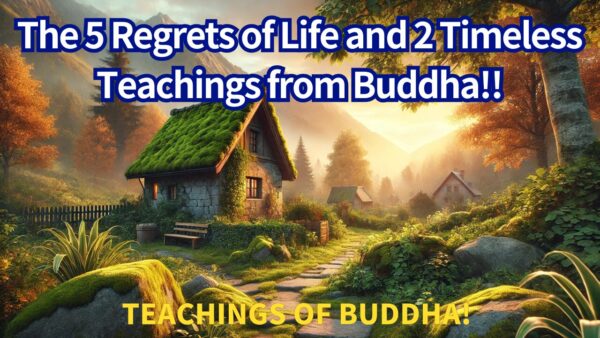
“The 5 Regrets of Life and Buddha’s Timeless Wisdom for a Fulfilled Life”
Introduction: Recognizing the Essence of Regret
Have you ever looked back on your life and thought, “If only I had done things differently”? Such moments often come when we face irreversible choices or reflect on precious opportunities we let slip by.
In this article, we will explore the five most common regrets people experience at the end of their lives, as well as two profound teachings from Buddha that can help us live without regret.
By understanding and embracing these lessons, you can chart a path toward a life filled with meaning and satisfaction. By the end of this article, you may find a new perspective that can transform your life.
Chapter 1: The Setting—Kendo and Makoto’s Encounter
Long ago, nestled in a remote mountain village, there lived a wise teacher named Kendo. Once a high-ranking advisor to the royal court, Kendo renounced his privileged life after a life-changing event—the passing of his beloved wife. Her final words deeply impacted him:
“I wish I had cherished our time together more.”
Though their love was profound, they had taken their time together for granted, believing there would always be another tomorrow. This realization set Kendo on a spiritual quest to uncover life’s ultimate truths.
One day, Makoto, a young merchant burdened by the pressures of city life, sought Kendo’s guidance. Exhausted and disillusioned, Makoto felt he had lost sight of something essential in his life.
Welcoming him warmly, Kendo offered a cup of tea and began to speak:
“I have spent years by the side of many as they faced the end of their lives. In those moments, I have heard five recurring regrets. Let me share them with you so that you may find clarity in your journey.”
Chapter 2: Regret 1—Not Living Authentically
Kendo began with the most common regret:
“I wish I had lived true to myself.”
Many people suppress their true desires and conform to societal expectations, only to regret it later. Kendo shared the story of a talented artist who abandoned his passion to inherit the family business. On his deathbed, he wept and said, “I should have listened to my heart.”
Makoto, too, had sacrificed his love for music to meet his family’s expectations. Hearing Kendo’s words, tears filled his eyes as he realized how much this regret resonated with his own life.
Chapter 3: Regret 2—Neglecting Time with Loved Ones
The second regret Kendo shared was:
“I wish I had spent more time with those I loved.”
Kendo recounted the story of a wealthy man who dedicated his life to building his fortune, neglecting his family in the process. At the end of his life, he confessed, “The moments I spent with my family were more valuable than all my riches.”
Makoto thought of his father, whose letters he had ignored in his busyness. This realization weighed heavily on his heart.
Chapter 4: Regret 3—Not Expressing Emotions
The third regret, Kendo explained, was:
“I wish I had expressed my emotions more freely.”
Many people suppress their feelings to appear strong or avoid vulnerability. A woman once lamented, “I wish I had said ‘I love you’ more often. I wish I had let myself feel anger, sadness, and joy openly.”
Makoto reflected on his relationship with his fiancée, realizing that he had often held back his true feelings, prioritizing work over heartfelt conversations.
Chapter 5: Regret 4—Overlooking Life’s Small Joys
Kendo then spoke about the importance of appreciating the small moments in life.
“Many regret not savoring life’s little joys,” he said. “A warrior I knew, who always chased grand achievements, admitted on his deathbed, ‘It’s the simple things—the sunrise, a child’s laughter—that are life’s true treasures.’”
A young monk asked, “But how can we notice these joys amidst life’s demands?”
Kendo replied with a smile, “It doesn’t require extra time. Noticing the beauty of the sky, savoring the taste of your meal, or appreciating someone’s smile—these are treasures hidden in plain sight.”
Chapter 6: Regret 5—Neglecting Personal Happiness
The final regret Kendo shared was:
“I wish I had pursued my own happiness.”
Many people sacrifice their joy for others, believing it to be virtuous. But Kendo emphasized that true happiness allows us to grow and share genuine compassion with others.
When asked if pursuing personal happiness was selfish, Kendo replied, “True happiness is never selfish. It’s intertwined with the growth of the soul and ultimately benefits everyone around you.”
Chapter 7: Buddha’s Teachings—Two Timeless Truths
To avoid these regrets, Kendo imparted two key teachings from Buddha:
- Material pursuits cannot bring lasting satisfaction.
- All things in life are impermanent, and clinging to them only causes suffering.
These principles remind us to focus on what truly matters and to let go of attachments that lead to pain.
Conclusion: Living a Life Without Regret
Kendo’s teachings transformed not only Makoto’s life but also the lives of many others.
This article invites you to reflect on your own life. Are you living authentically? Are you cherishing your relationships, expressing your emotions, and finding joy in the little things?
Life’s value lies not in its length but in how deeply we live each moment. Starting today, take a step toward a life free from regret—a life filled with purpose, connection, and joy.
Your Thoughts Matter
If this article resonates with you, please share your reflections. Your insights may inspire others to embrace a more meaningful life.
May this wisdom illuminate your journey, and may each day bring you closer to a life of true fulfillment.